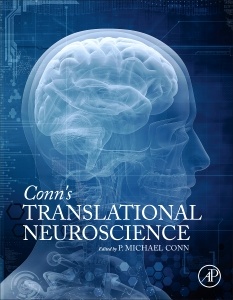Conn's Translational Neuroscience
Coordonnateur : Conn P. Michael

Conn?s Translational Neuroscience provides a comprehensive overview reflecting the depth and breadth of the field of translational neuroscience, with input from a distinguished panel of basic and clinical investigators. Progress has continued in understanding the brain at the molecular, anatomic, and physiological levels in the years following the 'Decade of the Brain,' with the results providing insight into the underlying basis of many neurological disease processes.
This book alternates scientific and clinical chapters that explain the basic science underlying neurological processes and then relates that science to the understanding of neurological disorders and their treatment. Chapters cover disorders of the spinal cord, neuronal migration, the autonomic nervous system, the limbic system, ocular motility, and the basal ganglia, as well as demyelinating disorders, stroke, dementia and abnormalities of cognition, congenital chromosomal and genetic abnormalities, Parkinson's disease, nerve trauma, peripheral neuropathy, aphasias, sleep disorders, and myasthenia gravis.
In addition to concise summaries of the most recent biochemical, physiological, anatomical, and behavioral advances, the chapters summarize current findings on neuronal gene expression and protein synthesis at the molecular level. Authoritative and comprehensive, Conn?s Translational Neuroscience provides a fully up-to-date and readily accessible guide to brain functions at the cellular and molecular level, as well as a clear demonstration of their emerging diagnostic and therapeutic importance.
1. Cytology of the Central Nervous System2. Ion Channels3. Neurotransmitters and Neurotransmission in the Developing and Adult Nervous System4. Synaptic Development5. The Peripheral and Central Nervous System6. The Blood–Brain Barrier: A Restricted Gateway to the Brain7. Autoregulation of Cerebral Blood Flow8. The Vestibular System9. The Cerebellum10. The Basal Ganglia11. Choroid Plexus–Cerebrospinal Fluid Transport Dynamics: Support of Brain Health and a Role in Neurotherapeutics12. The Cerebral Cortex13. The Thalamus14. Cranial Nerves and Brainstem15. Hypothalamic–Pituitary Regulation16. Neuroendocrinimmunology: A Primer17. The Olfactory System18. Intranasal Trigeminal Chemoreception19. Vision20. Oculomotor Systems and Control21. A Modern Clinicopathological Approach to Traumatic Brain Injury22. Posttraumatic Stress Disorder23. Somatosensation and Pain24. Neurogenesis as a Factor in the Functional Plasticity of the Nervous System25. Axonal Degeneration and Regeneration in the Peripheral and Central Nervous Systems26. Audition27. Body Clocks in Health and Disease28. The Experience of Consciousness29. The Emotional Brain30. Stress, Mood, and Pathways to Depression31. Language Processing, Development and Evolution32. Memory33. Neurobiology of Drugs of Abuse
Researchers, students, and practitioners in the fields of neurology and neuroscience
- Provides a fully up-to-date and readily accessible guide to brain functions at the cellular and molecular level, while also clearly demonstrating their emerging diagnostic and therapeutic importance
- Features contributions from leading global basic and clinical investigators in the field
- Provides a great resource for researchers and practitioners interested in the basic science underlying neurological processes
- Relates and translates the current science to the understanding of neurological disorders and their treatment
Date de parution : 10-2016
Ouvrage de 776 p.
19x23.3 cm



